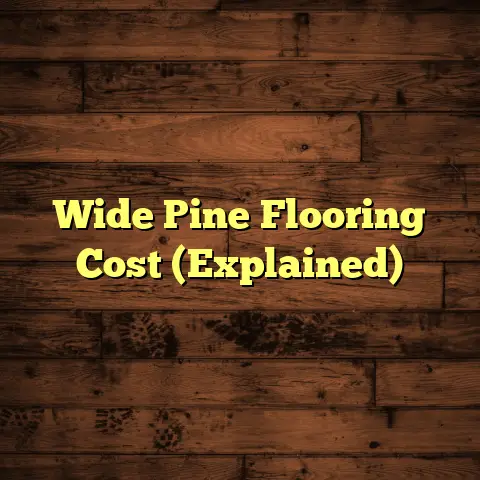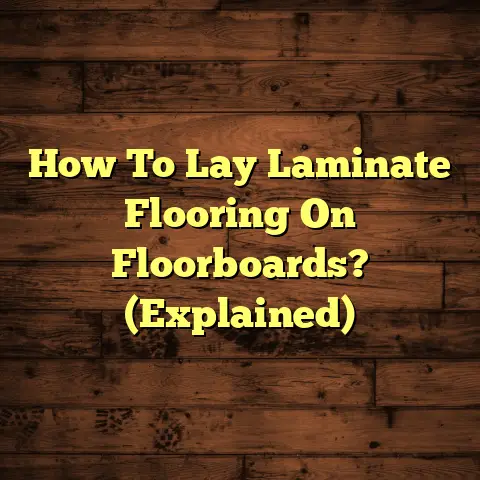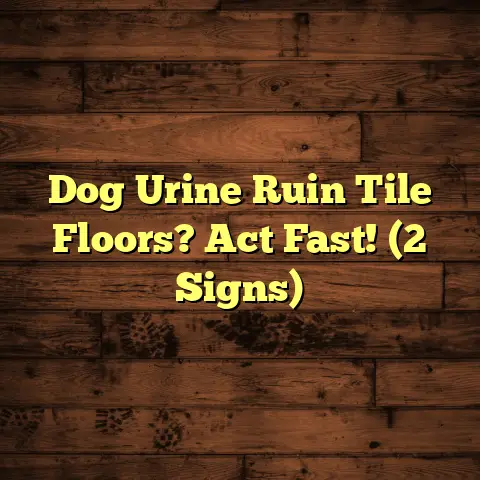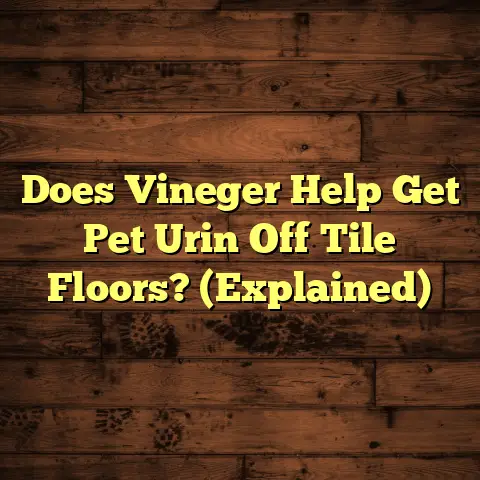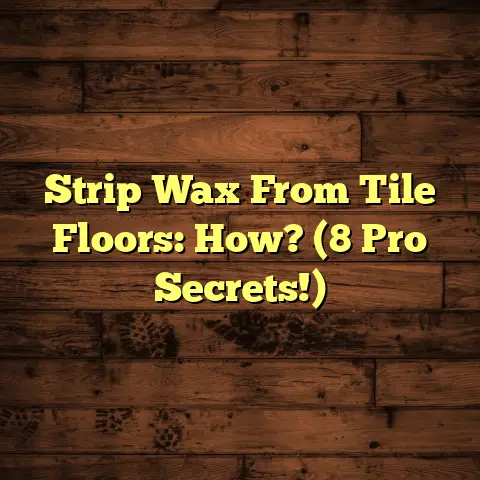Garage Floor Coating Costs? (Price Drop Alert!)
Hey folks! As a flooring contractor with years of experience, I’ve seen firsthand how a garage can transform from a neglected space into a functional extension of your home. One of the most impactful upgrades you can make? A garage floor coating.
Think about it: your garage floor takes a beating. Oil spills, dropped tools, heavy vehicles – it’s a constant battle against wear and tear. A quality coating not only protects your concrete but also elevates the entire look of your garage, making it a space you actually enjoy being in.
Beyond aesthetics, a coated garage floor is incredibly practical. It resists stains, wipes clean easily, and can even increase the lifespan of your concrete. Forget about those dusty, cracked floors that seem to absorb every spill.
Now, let’s talk money. Garage floor coatings have historically been seen as a premium upgrade. But guess what? The market is shifting! We’re seeing a price drop in many coating options, making it an ideal time to consider this investment.
In this article, I’ll break down everything you need to know about garage floor coating costs. We’ll explore the different types of coatings, the factors that influence pricing, and how to navigate the current market to get the best bang for your buck.
Ready to dive in and transform your garage? Let’s get started!
1. Understanding Garage Floor Coatings
So, what exactly are garage floor coatings? Simply put, they’re protective layers applied to your concrete floor to enhance its durability, appearance, and resistance to damage.
There’s a whole world of options out there, each with its own pros and cons. Let’s explore some of the most common types:
-
Epoxy: Epoxy coatings are probably the most popular choice. They’re known for their excellent adhesion, durability, and resistance to chemicals and abrasion. Epoxy creates a hard, glossy surface that’s easy to clean and maintain. However, epoxy can be susceptible to UV damage, and can yellow over time if not properly treated.
-
Polyaspartic: Polyaspartic coatings are a newer technology, and they’re gaining traction fast. They offer superior UV resistance, faster curing times (often ready for use in just a day!), and excellent flexibility. This means they’re less prone to cracking and chipping than epoxy. Polyaspartic tends to be more expensive than epoxy, but the added benefits can be worth the investment.
-
Polyurethane: Polyurethane coatings are often used as a topcoat over epoxy or polyaspartic. They provide excellent abrasion resistance and flexibility, making them a great choice for high-traffic areas. Polyurethane also offers good UV resistance and can enhance the gloss and color of the underlying coating.
-
Acrylic: Acrylic coatings are a more budget-friendly option. They’re easy to apply and offer decent protection against stains and spills. However, acrylic coatings are less durable than epoxy or polyaspartic, and they’re more susceptible to wear and tear.
The materials used in these coatings vary. Epoxy coatings typically consist of two parts: a resin and a hardener. When mixed together, these components create a chemical reaction that results in a hard, durable finish. Polyaspartic coatings also use a two-part system, but the chemical composition is different, resulting in faster curing times and improved UV resistance.
Now, a big question: DIY vs. Professional Installation?
You can definitely find DIY garage floor coating kits at your local hardware store. These kits can save you money upfront, but they require careful preparation and application. If you’re not experienced with flooring projects, you might end up with a less-than-perfect result.
Professional installation, on the other hand, ensures a proper surface preparation, expert application, and a durable, long-lasting finish. Professionals have the tools, knowledge, and experience to handle any challenges that might arise. Of course, professional installation comes at a higher cost.
Let’s be real: I’ve seen some DIY jobs that looked great at first but started peeling and chipping within a year. A professional installation, while more expensive initially, can save you money and headaches in the long run.
2. Factors Influencing Garage Floor Coating Costs
Alright, let’s get down to the nitty-gritty: what determines the price of a garage floor coating? Several factors come into play, and understanding them will help you budget effectively.
-
Size of the Garage: This one’s obvious! The larger your garage, the more material and labor will be required, and the higher the cost will be. A standard one-car garage (around 200-250 square feet) will cost less than a two-car garage (around 400-500 square feet).
-
Condition of the Existing Floor: Is your concrete floor smooth and crack-free, or is it riddled with cracks, stains, and damage? The worse the condition of your floor, the more prep work will be needed, which will increase the cost. This might include patching cracks, grinding down uneven surfaces, and removing existing coatings or contaminants.
-
Type of Coating Chosen: As we discussed earlier, different types of coatings have different price points. Epoxy tends to be more affordable than polyaspartic, while acrylic is the most budget-friendly option. The specific brand and quality of the coating will also affect the price.
-
Labor Costs for Professional Installation: Labor costs can vary depending on your location, the complexity of the project, and the experience of the contractor. Some contractors charge by the square foot, while others charge an hourly rate. Be sure to get multiple quotes and compare them carefully.
-
Geographic Location and Market Variations: Prices for garage floor coatings can vary significantly depending on where you live. Areas with a higher cost of living tend to have higher labor costs. Additionally, the availability of contractors and the demand for flooring services can influence pricing.
Let’s look at some examples:
Imagine you have a two-car garage (500 sq ft) in good condition. You opt for a standard epoxy coating and hire a professional installer. You might expect to pay somewhere in the range of $2,500 to $5,000.
Now, let’s say your garage floor is heavily damaged with cracks and oil stains. The contractor needs to spend extra time and materials on prep work. This could easily add another $500 to $1,000 to the total cost.
Or, if you choose a high-end polyaspartic coating instead of epoxy, you could be looking at a price increase of 20% to 50%.
The key takeaway? Get a thorough assessment of your garage floor and a detailed quote from a reputable contractor. Don’t be afraid to ask questions and negotiate!
3. Breakdown of Costs
Let’s break down those costs even further! Here’s a more detailed look at the individual components that make up the total price of a garage floor coating project:
-
Material Costs (per square foot):
- Epoxy: $3 – $7 per square foot
- Polyaspartic: $6 – $12 per square foot
- Polyurethane: $4 – $8 per square foot
- Acrylic: $1 – $3 per square foot
These are just average ranges, of course. The specific price will depend on the brand, quality, and any special features (like metallic flakes or anti-slip additives).
-
Labor Costs (if hiring professionals):
- Professional Installation: $2 – $5 per square foot
This includes the cost of surface preparation, application of the coating, and any necessary cleanup. Keep in mind that labor costs can vary depending on the complexity of the project and the experience of the contractor.
-
Additional Expenses (prep work, repairs, and sealing):
- Crack Repair: $50 – $200 per crack
- Grinding: $1 – $3 per square foot
- Cleaning and Degreasing: $50 – $150
- Sealing (optional): $1 – $2 per square foot
These are just estimates, of course. The actual cost will depend on the extent of the damage and the specific methods used.
Here’s a comparison table to summarize the average costs:
| Coating Type | Material Cost (per sq ft) | Labor Cost (per sq ft) | Total Cost (per sq ft) |
|---|---|---|---|
| Epoxy | $3 – $7 | $2 – $5 | $5 – $12 |
| Polyaspartic | $6 – $12 | $2 – $5 | $8 – $17 |
| Polyurethane | $4 – $8 | $2 – $5 | $6 – $13 |
| Acrylic | $1 – $3 | $1 – $3 | $2 – $6 |
Important Note: These are just average costs. Your actual price may vary depending on the specific factors we discussed earlier. Always get multiple quotes from reputable contractors to get the most accurate estimate.
Pro Tip: Don’t be afraid to ask your contractor for a detailed breakdown of the costs. This will help you understand where your money is going and identify any potential areas where you can save.
4. Current Market Trends and Price Drops
Now for the exciting part: the price drop!
The garage floor coating market has seen some interesting shifts in recent years. We’re seeing increased competition among manufacturers, advancements in coating technology, and even some economic factors that are driving prices down.
For example, the rise of online retailers has made it easier for consumers to compare prices and find deals. This increased competition has forced manufacturers to lower their prices to stay competitive.
Additionally, advancements in coating technology have led to more efficient manufacturing processes and lower material costs. Polyaspartic coatings, for instance, have become more affordable as the technology has matured.
According to a report by MarketWatch, the global floor coatings market is expected to grow in the coming years, but this growth is also driving innovation and competition, which ultimately benefits consumers through lower prices.
I’ve personally noticed a decrease in the price of certain epoxy and polyaspartic coatings over the past year. Some manufacturers are offering discounts and promotions to attract new customers.
Here are a few examples of current promotions and discounts that I’ve seen:
- Manufacturer X: Offering a 15% discount on all epoxy floor coating kits for a limited time.
- Retailer Y: Offering free shipping on all garage floor coating orders over $500.
- Contractor Z: Offering a bundled discount on garage floor coating and concrete repair services.
How can you benefit from these price changes?
- Shop around: Compare prices from multiple suppliers and contractors.
- Look for promotions and discounts: Keep an eye out for sales, coupons, and bundled offers.
- Consider off-season installation: You might be able to get a better price if you schedule your project during the slower months (like winter).
- Negotiate: Don’t be afraid to negotiate with your contractor. They might be willing to lower their price to win your business.
Remember: The price drop doesn’t mean you should compromise on quality. Always choose a reputable brand and a qualified contractor to ensure a long-lasting and durable finish.
5. Return on Investment (ROI)
Okay, so you’re spending money on a garage floor coating. But what’s the return on that investment?
A coated garage floor can add significant value to your home in several ways:
-
Increased Home Value: A well-maintained garage can be a major selling point for potential buyers. A coated floor enhances the overall appearance and functionality of the garage, making it more appealing. According to a study by Remodeling Magazine, garage renovations can have a positive impact on home resale value. While they don’t specifically mention floor coatings, a clean and updated garage contributes to the overall impression of a well-maintained home.
-
Improved Usability: A coated floor makes your garage a more usable space. It’s easier to clean, more resistant to stains and spills, and more comfortable to walk on. You can use your garage for hobbies, projects, or even as an extra living space.
-
Reduced Maintenance Costs: A coated floor protects your concrete from damage, preventing cracks, stains, and other issues that can lead to costly repairs. It also reduces the need for frequent cleaning and maintenance.
-
Enhanced Aesthetics: Let’s be honest, a coated garage floor just looks good! It can transform a drab, utilitarian space into a clean, organized, and attractive area.
Let’s look at some real-life examples:
Case Study 1:
John, a homeowner in Denver, Colorado, invested in a polyaspartic garage floor coating for his two-car garage. He spent around $4,000 on the project. A few years later, he decided to sell his home. His realtor told him that the updated garage was a major selling point, and he ended up getting $5,000 more for his home than he had expected.
Case Study 2:
Sarah, a homeowner in Atlanta, Georgia, had a cracked and stained garage floor. She decided to invest in an epoxy coating to protect the concrete and improve the appearance of her garage. She spent around $2,500 on the project. Over the next few years, she saved money on cleaning supplies and avoided costly concrete repairs.
Testimonials:
“I love my new garage floor! It’s so easy to clean, and it looks amazing. It’s definitely one of the best investments I’ve made in my home.” – Michael, homeowner
“I was hesitant to spend the money on a garage floor coating, but I’m so glad I did. It’s made my garage a much more usable space, and it’s added value to my home.” – Lisa, homeowner
The Bottom Line:
A garage floor coating is an investment that can pay off in the long run. It adds value to your home, improves usability, reduces maintenance costs, and enhances aesthetics.
But remember: The ROI will depend on several factors, including the type of coating you choose, the quality of the installation, and the overall condition of your garage. Do your research and choose wisely!
6. Conclusion
Alright, we’ve covered a lot of ground! Let’s recap the key takeaways:
Garage floor coatings are a fantastic way to protect your concrete, enhance the appearance of your garage, and increase the value of your home.
There are several different types of coatings to choose from, each with its own pros and cons. Epoxy, polyaspartic, polyurethane, and acrylic are some of the most common options.
The cost of a garage floor coating project depends on several factors, including the size of your garage, the condition of the floor, the type of coating you choose, and the labor costs for professional installation.
And here’s the exciting part: we’re seeing a price drop in many garage floor coating options! This is due to increased competition, advancements in technology, and other market factors.
This means that now is an ideal time to consider investing in a garage floor coating. You can get a high-quality product at a more affordable price.
Remember to shop around, compare prices, and look for promotions and discounts. And always choose a reputable brand and a qualified contractor to ensure a long-lasting and durable finish.
A well-coated garage floor is an investment that will pay off in the long run. It will add value to your home, improve usability, reduce maintenance costs, and enhance aesthetics.
So, what are you waiting for? Transform your garage today!
Call to Action:
Ready to take the next step? I encourage you to do further research on garage floor coatings, obtain quotes from local contractors, and carefully consider your options. Take advantage of the current favorable market conditions and give your garage the upgrade it deserves! You can start by searching online for “garage floor coating contractors near me” or “best garage floor coating reviews.” Good luck, and happy flooring!
